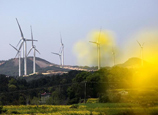
Few on the road and a shortage of facilities
Despite strong government support for new-energy vehicles, fewer than 20,000 have been sold over the past two years, according the latest figures from the Ministry of Science and Technology.
A major cause for low sales is the nation's scarcity of electric charging facilities, say industry experts. In Beijing, a map of the capital's stations shows the city now has just 14 in operation, most of them in the suburbs outside the Fifth Ring Road.
They mostly service electric buses, with just a few designed to accommodate privately owned cars.
At a station near the Third Ring Road, 21 charging stalls now sit half finished.
Staff working at a nearby parking lot said construction on the station began at the beginning of last year, but work gradually slowed to a halt.
Beijing Electric Power Co, an affiliate of the country's electricity monopoly State Grid, is the main builder of the city's electric vehicle charging stations.
The company said it built 60 charging stations with 1,080 charging stalls by the end of 2012, but few are now operational.
But a plan by the Beijing municipal government calls for 256 stations and 42,000 charging stalls by the end of 2015.
According to Xu Heyi, president of BAIC Motor Corp, the local governments of some densely populated cities are now promoting pure electrics and plug-in hybrids to ease increasing environmental pressures.
But he said it has proven very difficult for businesses to get land for charging facilities in high-density cities.
"Parking is already a problem, let alone building new charging stations," he said.
 |
















 Life aboard a fishing boat under bridge in city of Chongqing
Life aboard a fishing boat under bridge in city of Chongqing


![]()
